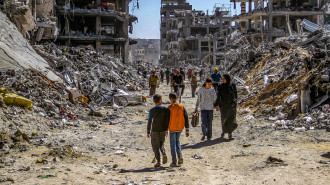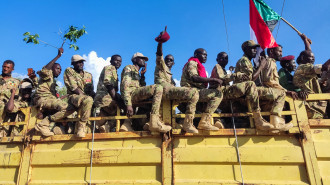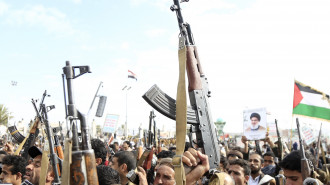Mass censorship and burial of truth under Yemen’s Houthis
The dreams of the ordinary Yemeni citizen for freedom after Ali Abdullah Saleh was shattered as the Houthis began to violate the most basic freedoms and liberties – press freedoms included.
Under the Houthis, dissidents are subject to enforced disappearance or imprisonment where they are tortured, denied visitation rights, and prevented from medical care.
Shortly after the Houthi coup, media outlets that opposed the rebels were closed down, or commandeered.
One of the most prominent outlets hijacked by the Houthis was the state news agency Saba News which fell under Houthi control in January 2015, after its headquarter in Yemen’s capital city was ransacked.
Outlets that do not toe the Houthi line remain a target.
 |
One of the most prominent outlets hijacked by the Houthis was the state news agency Saba News which fell under Houthi control in January 2015 |  |
For more than two years, the Houthis have been carrying out arrests and kidnappings against an increasing number of opposition writers and activists, especially journalists.
Thousands of political prisoners are still being held behind Houthi prison bars, many of them journalists.
Last month, Reporters without Borders launched an urgent appeal for the release of 10 journalists held in Houthi prisons, saying the detainees were living in difficult conditions.
The watchdog confirmed that it had information on five journalists detained by the Houthi group in the Political Security Prison in Sanaa.
"While the country is facing a catastrophic political, security and humanitarian situation, journalists are being targeted in this cycle of conflict, where they are seen as suspects," said Alexandra Al-Khazen, director of the Middle East office at the organisation.
 |
While the country is facing a catastrophic political, security and humanitarian situation, journalists are being targeted in this cycle of conflict, where they are seen as suspects |  |
Families of these prisoners are not allowed to provide their relatives with medicines and clothing.
In another documented case, journalists Abdullah Qabal and Yousef al-Eizari were were killed in an air attack by the Saudi-led coalition's airliner on a Houthi military base. They were being held by the Houthis in an explosives storeroom at the base in Dhamar province to the south of Sanaa.
Last year, a group of activists called for the release of journalists detained by the Houthis, including 10 who have been detained and tortured for more than two years without trial.
The activists launched a hashtag on social media, ‘Houthis torture journalists’, to draw the international community’s attention to the deteriorating situation of the detained journalists in Houthi prisons.
The Houthis reacted to the campaign by transferring the detainees to an unknown destination, before families were even able to reach the initial location of some of the detainees.
In addition to torturing, kidnapping and holding journalists in dangerous places, the Houthis have managed to silence much of the opposition media.
Anti-Houthi Yemeni journalists have resorted to sacrificing their media careers, while many of them fled the country in search of safety in Saudi Arabia, Turkey and elsewhere.
 |
Anti-Houthi Yemeni journalists have resorted to sacrificing their media careers, while many of them fled the country in search of safety in Saudi Arabia, Turkey and elsewhere |  |
In some cases, for personal safety, independent media outlets and journalists who are unable to leave Yemen had found themselves in the position of having no choice, but to align themselves with Houthi media trends.
The religious motivation behind such censorship must not be ignored either. Many observers believe that the freedom of expression in Yemen is also suffering from the ideological vision of the Houthis imposed on all the visual, and audio media.
Like any religious group, the Houthis believe that all the media must adhere to the obedience of the "Leader of the Islamic Revolution," Abdul-Malik al-Houthi.
Since fundamentally the Houthi group is at large religiously motivated, they tend to look at different issues through religious angles and journalists straying from a religiously sectarian motivated discourse could find themselves facing serious recriminations.
According to Reporters without Borders, Yemen is ranked 170th (out of 180 countries) on the World Press Freedom Rating.
With censorship, torture, and forced disappearance under the Houthi rule, Yemen is sinking further into a press freedoms dystopia.
Mohammed Jumeh is a columnist and editor of Al-Quds Al-Arabi, as well as a Member of the Yemeni National Dialogue Conference in Yemen. He holds a doctorate in Texts translation and has published a number of studies for various policy centres. Follow him on Twitter: @MJumeh
Follow our full World Press Freedom coverage here:
 |
|





 Follow the Middle East's top stories in English at The New Arab on Google News
Follow the Middle East's top stories in English at The New Arab on Google News


